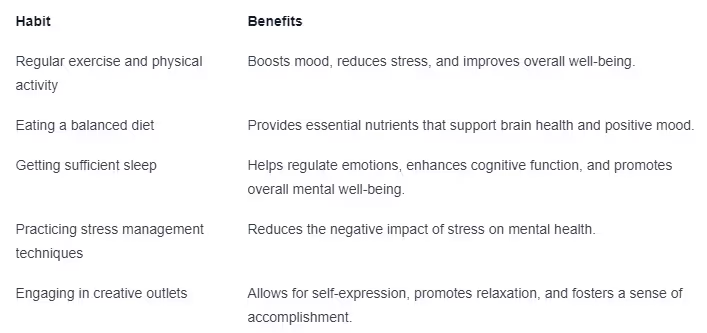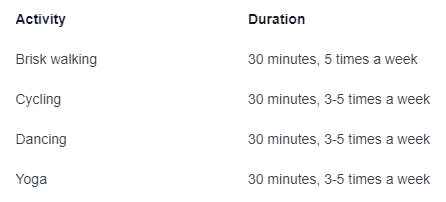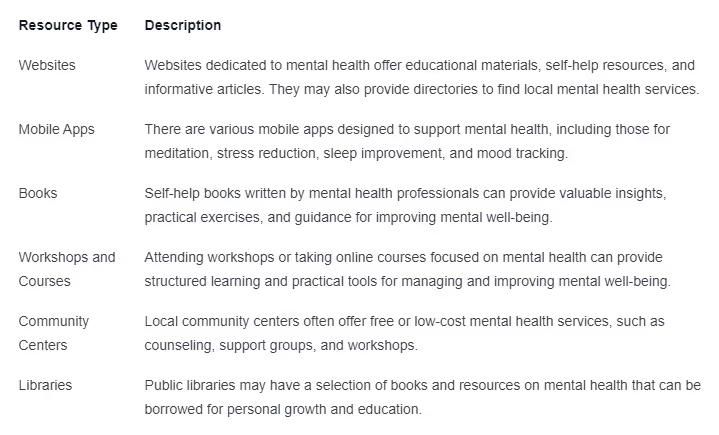Ways to Take Care Of Your Mental Health

The Importance of Mental Health
To lead a fulfilling and balanced life, it is crucial to prioritize and improve mental health. Understanding the concept of mental health and recognizing its significance can pave the way for a healthier and happier existence.
Understanding Mental Health
Mental health refers to a person's emotional, psychological, and social well-being. It encompasses how individuals think, feel, and act, as well as how they cope with stress, interact with others, and make choices. Mental health is a fundamental aspect of overall well-being and contributes to one's ability to navigate various aspects of life effectively.
A healthy mental state allows individuals to handle challenges, maintain healthy relationships, and make positive contributions to their communities. It enables them to adapt to changes and cope with the ups and downs of life. Mental health is not just the absence of mental illnesses; it is a state of well-being that allows individuals to reach their full potential.
Why Improving Mental Health Matters
Improving mental health is vital because it impacts every aspect of a person's life. When mental health is neglected, it can lead to various issues, such as decreased productivity, strained relationships, and reduced quality of life. Conversely, taking steps to improve mental health can have profound benefits.
By prioritizing mental health, individuals can experience increased resilience, better emotional well-being, and improved overall functioning. It can enhance their ability to handle stress, make sound decisions, and maintain healthy relationships. Improving mental health can also contribute to increased self-esteem, a greater sense of purpose, and improved overall life satisfaction.
Taking care of mental health is a lifelong journey that involves various strategies and techniques. In the following sections, we will explore powerful ways to improve mental health, including engaging in regular exercise, practicing mindfulness and meditation, seeking support, engaging in creative outlets, and managing stress through relaxation techniques.
Remember, improving mental health requires a holistic approach. It involves self-care, establishing healthy habits, nurturing positive thinking, setting realistic goals, and seeking professional help when needed. By investing in mental health, individuals can unlock inner peace, resilience, and a greater sense of well-being.
Building a Foundation for Mental Health
To improve mental health, it's essential to build a strong foundation by prioritizing self-care and establishing healthy habits. These foundational practices provide the groundwork for overall well-being and contribute to a positive mindset.
Prioritizing Self-Care
Self-care is crucial for maintaining mental health and should be considered a priority in our daily lives. It involves taking intentional actions to nurture and care for oneself, both physically and emotionally. By incorporating self-care practices into our routines, we can reduce stress, increase resilience, and improve our overall mental well-being.
Self-care can take various forms, depending on individual preferences and needs. It may involve activities such as:
- Engaging in hobbies or activities that bring joy and relaxation.
- Practicing mindfulness and meditation to cultivate present-moment awareness and reduce stress.
- Creating boundaries and saying no to activities that drain energy or cause unnecessary stress.
- Prioritizing quality sleep and establishing a consistent sleep schedule.
- Nurturing social connections by spending time with supportive friends and family.
- Engaging in activities that promote physical well-being, such as exercise or yoga.
- Setting aside time for self-reflection and journaling.
- Incorporating relaxation techniques, such as deep breathing exercises or taking soothing baths.
By making self-care a priority, individuals can better manage stress, strengthen their mental resilience, and improve their overall mental health.
Establishing Healthy Habits
Establishing healthy habits is another crucial aspect of building a foundation for good mental health. These habits involve consistent practices that promote well-being and contribute to a positive mindset. By incorporating these habits into our daily lives, we can create a supportive environment for our mental health.
Some healthy habits that can positively impact mental health include:

By incorporating these healthy habits into our routines, we create a solid foundation for mental health and well-being. It's important to remember that establishing healthy habits is a process that takes time and consistency. Small, gradual changes can lead to significant improvements in mental health over time.
In the next section, we will explore powerful ways to improve mental health, including regular exercise, mindfulness and meditation, seeking support, engaging in creative outlets, and stress management techniques. These practices, when combined with a strong foundation of self-care and healthy habits, can contribute to long-term mental well-being.
Powerful Ways to Improve Mental Health
Improving mental health is a journey that involves adopting various strategies and practices. By incorporating these powerful techniques into your routine, you can enhance your overall well-being and promote positive mental health.
Regular Exercise and Physical Activity
Engaging in regular exercise and physical activity is not only beneficial for your physical health but also plays a significant role in improving mental well-being. Physical activity releases endorphins, which are known as "feel-good" hormones, and can help reduce symptoms of stress, anxiety, and depression.

Practicing Mindfulness and Meditation
Mindfulness and meditation techniques can help calm the mind, reduce stress, and improve overall mental health. By focusing on the present moment and observing your thoughts and emotions without judgment, you can cultivate a sense of inner peace and clarity.
There are various mindfulness techniques you can incorporate into your daily routine, such as deep breathing exercises, body scans, and guided meditations.
Seeking Support and Building Connections
Building a strong support network and fostering meaningful connections with others is essential for maintaining good mental health. It's important to reach out to trusted friends, family members, or professionals when needed. Sharing your thoughts and feelings with others can provide comfort, perspective, and a sense of belonging.
Additionally, participating in support groups or seeking therapy can offer valuable insights, guidance, and coping mechanisms. Remember, seeking support is a sign of strength, and there are resources available to help you through difficult times.
Engaging in Creative Outlets
Engaging in creative activities can be a powerful way to improve mental health. Whether it's painting, writing, playing an instrument, or engaging in crafts, these activities allow self-expression and provide a sense of accomplishment and fulfillment. Creativity can also serve as a form of therapy, allowing individuals to channel their emotions and thoughts into something tangible.
Managing Stress and Practicing Relaxation Techniques
Stress management is vital for maintaining good mental health. Incorporating relaxation techniques into your routine can help reduce stress levels and promote a sense of calm. Techniques such as deep breathing exercises, progressive muscle relaxation, and mindfulness-based stress reduction can all be effective in managing stress.
By incorporating these powerful ways to improve mental health into your daily life, you can foster a positive and supportive environment for your overall well-being. Remember, it's important to prioritize self-care, seek support when needed, and engage in activities that bring you joy and fulfillment.
Nurturing Positive Mental Health
While improving mental health involves addressing challenges and seeking support, it is equally important to focus on nurturing positive aspects. Cultivating gratitude, setting realistic goals, and practicing self-compassion are powerful ways to promote positive mental health.
Cultivating Gratitude and Positive Thinking
Cultivating gratitude and adopting a positive mindset can have a profound impact on mental well-being. By consciously acknowledging and appreciating the good things in life, individuals can shift their perspective and focus on the positive aspects. This practice can help combat negative thoughts and foster a sense of contentment.
To cultivate gratitude, individuals can keep a gratitude journal, writing down three things they are grateful for each day. Additionally, incorporating positive affirmations and reframing negative thoughts into more positive ones can help foster a more optimistic outlook.
Setting Realistic Goals and Celebrating Achievements
Setting realistic goals is essential for maintaining motivation and a sense of accomplishment. When individuals set achievable goals, they build confidence and self-esteem as they work towards and eventually achieve them. It's important to break down larger goals into smaller, manageable steps to make progress more attainable.
When goals are achieved, it is crucial to celebrate these accomplishments. Celebrating milestones, no matter how small, reinforces a positive mindset and fosters a sense of pride and satisfaction. This celebration can be as simple as treating oneself to something special or sharing the achievement with loved ones.
Practicing Self-Compassion and Acceptance
Practicing self-compassion and acceptance involves treating oneself with kindness and understanding, particularly during challenging times. It is important to acknowledge that everyone faces difficulties and setbacks, and it is okay to experience negative emotions. By showing self-compassion, individuals can avoid self-criticism and cultivate a more nurturing and supportive relationship with themselves.
Acceptance is another crucial aspect of nurturing positive mental health. It involves acknowledging and embracing one's strengths and limitations, as well as accepting circumstances that cannot be changed. Acceptance allows individuals to let go of perfectionism and find peace in the present moment.
Nurturing positive mental health involves actively incorporating practices like cultivating gratitude, setting realistic goals, and practicing self-compassion and acceptance into daily life. These practices contribute to a more positive mindset and can enhance overall well-being.
Professional Help and Resources
While there are many powerful ways to improve mental health on your own, sometimes seeking professional help and utilizing available resources can provide additional support and guidance. Recognizing the need for help is an important step in the journey towards better mental health.
Recognizing the Need for Help
Recognizing when you need professional help is crucial for addressing mental health concerns effectively. It's important to be aware of signs that may indicate the need for professional assistance, such as:
- Persistent feelings of sadness, hopelessness, or anxiety.
- Difficulty carrying out daily activities or fulfilling responsibilities.
- Changes in appetite, sleep patterns, or energy levels.
- Increased irritability or anger.
- Substance abuse or excessive use of alcohol.
- Thoughts of self-harm or suicide.
If you experience any of these symptoms or notice them in someone you care about, it may be an indication that professional help is necessary. Remember, reaching out for support is not a sign of weakness, but rather a brave and proactive step towards better mental well-being.
Accessing Mental Health Support
Accessing mental health support can involve various options, depending on individual needs and preferences. Here are a few common avenues for seeking professional help:
- Therapy or Counseling: Working with a therapist or counselor can provide a safe and confidential space to explore and address mental health concerns. They can offer guidance, coping strategies, and specialized treatment approaches tailored to your specific needs.
- Psychiatry: A psychiatrist is a medical doctor specializing in mental health. They can evaluate, diagnose, and prescribe medications if necessary. Combining therapy with psychiatric treatment can be helpful for certain mental health conditions.
- Support Groups: Joining support groups allows you to connect with others who may be going through similar challenges. Sharing experiences, insights, and coping strategies within a supportive community can be beneficial.
- Hotlines and Helplines: Many organizations provide helplines or crisis hotlines staffed by trained professionals who can offer immediate support and guidance during times of distress. These helplines are often available 24/7.
Online and Offline Resources for Mental Health
In addition to professional help, there are numerous online and offline resources available to support mental health. These resources provide information, tools, and strategies to enhance well-being. Some examples include:

Remember, it's important to choose reputable resources and consult with professionals when needed. Mental health is a journey, and accessing professional help and utilizing available resources can provide valuable guidance and support along the way.
Conclusion
In conclusion, prioritizing mental health and well-being is crucial for leading a fulfilling life. By building a foundation of self-care, healthy habits, and powerful techniques like regular exercise, mindfulness and meditation, seeking support, engaging in creative outlets, and stress management techniques, individuals can promote positive mental health and enhance their overall well-being. Additionally, nurturing positive aspects like gratitude, setting realistic goals, and practicing self-compassion and acceptance can contribute to a more positive mindset.
Remember that seeking professional help and utilizing available resources is always an option for additional support on the journey towards better mental health. With dedication and effort, anyone can take steps towards improving their mental health and living a happier life.
Sources:
- https://www.nimh.nih.gov/health/topics/caring-for-your-mental-health
- https://www.who.int/westernpacific/about/how-we-work/pacific-support/news/detail/07-10-2021-6-ways-to-take-care-of-your-mental-health-and-well-being-this-world-mental-health-day
- https://www.doctorsmanteca.com/healthy-living/corporate-content/seven-ways-to-take-care-of-your-mental-health
